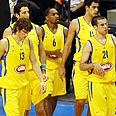
Maccabi Tel Aviv's basketball team is an economic abomination. This team is owned by some of the country's richest figures. It boasts an annual budget that is larger than the budgets of most other local basketball teams combined. It adopts a policy that in any other economic sphere would have been perceived as indecent: It paralyses its opponents.
It does so when it comes to Israeli players, by acquiring every Israeli player that reaches a decent level. This is not so much for the sake of the player's future, but more so to prevent other teams, Maccabi's competitors, from enjoying his services. In any other economic sphere Maccabi Tel Aviv would have been declared a monopoly – a body whose economic conduct is subject to public monitoring. A monopoly, according to the Israeli economy, is not a sole "producer" in the market, but rather, one that holds an overwhelming share of the market.
Yet nobody touches Maccabi Tel Aviv's basketball team, even though it's just like an economic monopoly. The master's failure – that is, Maccabi's failure to reach this evening's event – is therefore a cause for celebration.
Maccabi Tel Aviv is the main destructive element in Israeli basketball. It's the one that initiated and since then pushed for the expansion of employing foreign basketball players. Today there's no meaningful Israeli basketball because of Maccabi Tel Aviv and its ilk.
What happened is that all other teams discovered there's no way to compete against Tel Aviv except with foreign workers. And so, the game to be held tonight will feature Nailon, Belcher, Williams, Morris, Bowers, Austin, Cota, as well as a few Israelis. Maccabi is not Tel Aviv. Hapoel is not Jerusalem. And Bnei is not from the Sharon region. Those are misleading names for unemployed basketball players from abroad who found employment in Israel.
Should we hire Hizbullah fighters?
The supporters of the team that calls itself Tel Aviv argue that employing foreigners is the only way to compete successfully in the international basketball market. why? Because that's what the entire world does. Indeed, anyone who takes a look at basketball teams (and this exists in other sports as well) sees that foreign work is the global norm.
So what? Let's say this argument is correct, and that the only way to compete in the European Cup is to employee foreigners. So Shimon Mizrahi, and Federman, and Katz and Gaydamak, and other wealthy basketball owners should purchase a Belgian or Slovenian toy and play with it over there. Why is it good for us Israelis that five unemployed Americans be hired here and not in Slovenia? And if Mizrahi and Co. really like Israel, they can even import an Israeli basketball player to their Belgian team. Just like what they're doing in the teams that call themselves Tel Aviv, or Jerusalem, or HaSharon.
But this argument isn't true at all. For example, look at the Osem food company. Does the Tzabar plant it owns employee foreign workers? No. However, Mizrahi will say, Osem doesn’t operate in the international market. That's not entirely true, but let's take pharmaceutical giant Teva, which sells more than 90 percent of its products abroad. And it does all this, unbelievable really, with Israeli workers.
Teva also has factories abroad and they take part in production and sales. So David Federman can buy himself a plant overseas, as Teva did and is still doing.
By employing foreign basketball players, Maccabi Tel Aviv is destroying the Israeli production of basketball players. Because why should we employee an Israeli when we can get a foreigner for less money? If there are two players whose playing level is exactly the same, an Israeli and a foreigner, the team will prefer a foreigner because his cost – considering the low tax rates on foreigners – is lower.
A basketball game features teams of five players. Most of the time you'll find four foreigners and one Israeli on the court. It's not a matter of abilities, but rather, of money.
Those who are still convinced by the millionaires' logic should explain why we don't expand this approach. We'll allow our local banks to compete in the global financial market through foreign workers. We'll enable the army to succeed in the next war with the help of foreign fighters, from Hizbullah let's say. And so on and so forth.
It's surprising that Shas member Eli Yishai, who is the employment minister, cooperates with this foreign work. It's surprising that Knesset members, who are known to be infuriated over unemployment rates, enable foreigners to gain employment here through generous tax benefits. Actually, it's not surprising.















